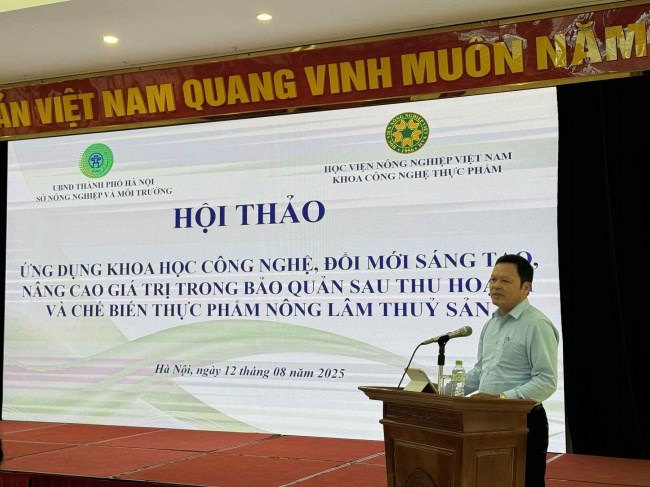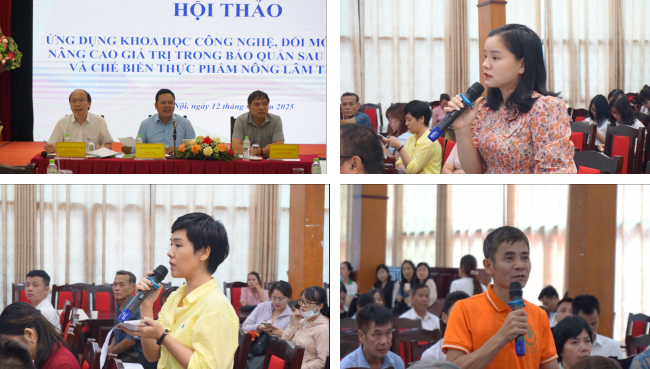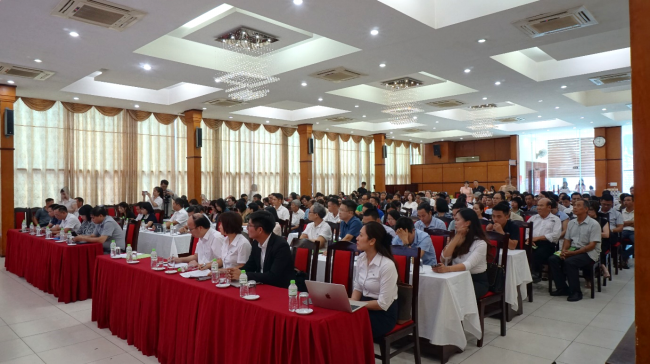On August 12, 2025, at the Guest House of the Party Central Committee, the Hanoi Department of Agriculture and Environment, in collaboration with the Faculty of Food Technology (Strong Research Group on Microorganisms and Food Safety) of the Vietnam National University of Agriculture, organized a workshop titled:
“Application of Science and Technology, Innovation, and Value Enhancement in Post-Harvest Preservation and Processing of Agricultural, Forestry, and Fishery Products.”
The event is part of the city’s ongoing efforts to promote a modern, sustainable agricultural sector built on a foundation of science and technology.
In the opening remarks, a representative from the Hanoi Department of Agriculture and Environment emphasized the importance of removing barriers and promoting technological adoption to improve the competitiveness and value of the city’s agricultural products. The workshop served as a platform for scientists, businesses, and farmers to exchange ideas and explore practical and integrated solutions.

Current Situation and Challenges
Mrs. Nguyen Thi Thu Hang, Head of the Quality and Market Development Division, presented an overview of agricultural, forestry, and fishery production and business in Hanoi.
The city currently has 13,739 establishments, including more than 1,700 processing facilities, with 98.5% being small and medium-sized enterprises (SMEs). As a result, many agricultural products are still sold fresh, leading to low added value.
Processed and ready-to-eat products in modern retail channels account for only 20–25%, and Hanoi’s own processing output meets just around 20% of local demand, with the remainder supplied by other provinces or imported.
She highlighted several internal challenges, including:
-
Limited technological capacity,
-
Low levels of mechanization and automation, resulting in low productivity and high costs,
-
Lack of large enterprises capable of making substantial investments,
-
Difficulties in accessing land and capital for scaling up production.
She also proposed several policy and technical solutions to address these issues in the near future.
Scientific and Technological Solutions
The workshop continued with several in-depth scientific presentations, focusing on practical technological applications:
-
Assoc. Prof. Dr. Vu Thi Kim Oanh (Vietnam National University of Agriculture) introduced Modified Atmosphere Packaging (MAP) technology—an effective method to slow down respiration and inhibit spoilage microorganisms in agricultural products such as leafy vegetables, fruits, roots, edible mushrooms, pre-cut produce, fresh meat, and processed meat.
She showcased various MAP models, both stand-alone and in combination with sensor packaging, absorbents, and smart indicator labels, illustrated through vivid practical examples.
-
Dr. Cong Hong Hanh (Institute of Materials Science – Vietnam Academy of Science and Technology) presented the potential of nanotechnology, particularly the use of metal nanoparticles (Cu, Fe, Co, Ag).
Research has demonstrated their positive effects on seed treatment, disease prevention for crops and livestock, and the antimicrobial power of silver nanoparticles, which proved effective against fungi on ginger plants and bacteria in shrimp farming environments.
-
Mr. Nguyen Manh Hieu (Institute of Agricultural Engineering and Post-Harvest Technology) discussed innovations in preservation and processing technologies.
Addressing the current state and challenges of Hanoi’s agricultural supply chains, he proposed solutions including intelligent cold storage systems, MAP packaging, cold drying, and the application of AI and Blockchain to optimize supply chain management.
His practical results have contributed significantly to elevating Vietnamese agricultural products to global markets.

Towards an Innovation Ecosystem
The discussion session reaffirmed the need for a comprehensive innovation ecosystem, with strong collaboration between the State, scientists, businesses, and farmers, to transform innovative ideas into reality and enhance the value and competitiveness of Vietnamese agricultural products on the international stage.

–
Strong Research Group on Microorganisms and Food Safety
Faculty of Food Technology
Vietnam National University of Agriculture